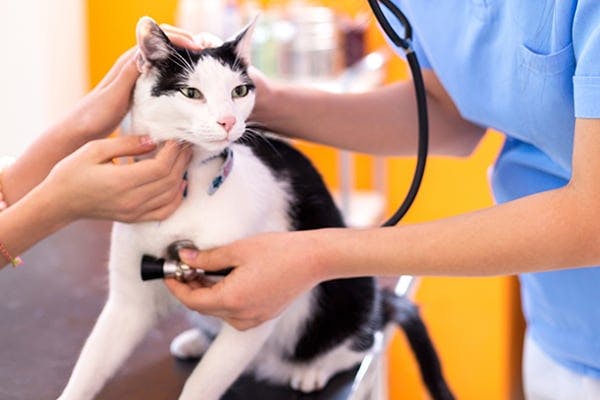

Fast breathing during dormancy (not panting).Shortness of breath or difficulty breathing possibly accompanied by fluid buildup in the lungs and chest.Difficulty with or discontinuing exercise.There are several possible symptoms of heart problems in cats that cat owners can be on the lookout for, including: Advanced heart failure: Critical clinical signs are evident, including respiratory distress, ascites (fluid in the body cavity), and profound exercise intolerance.The prognosis will worsen with each passing stage, and the need for aggressive treatment will increase.Mild to moderate heart failure: Significant clinical signs of congestive heart failure are in evidence both at rest and while active.Additionally, a heart murmur in cats or arrhythmia may also be present.

Asymptomatic: Heart disease in cats is detected, but there is a lack of any outward signs.There are also various stages of heart disease and congestive heart failure in cats that veterinarians use to determine severity: The disturbance in the blood flow causes abnormal vibration or a heart murmur in cats. Defects in the wall that divides the right and left halves of the heartīoth types of congenital heart disease cause blood to flow abnormally through the defect.While cardiomyopathy is the most common form of acquired, adult onset heart problems in cats, the two most common types of congenital heart disease in cats are: Acquired, or adult onset heart disease in cats often occurs in middle-aged to older animals due to wear and tear on the heart structures, but can also result from an injury or infection.Congenital heart disease in cats is present at birth, and can be inherited from the parents.Heart disease in cats can be either congenital or acquired: Heart disease in cats is a medical precursor to congestive heart failure in cats, because heart disease can lead to congestive heart failure in cats if untreated. Heart disease is a condition in which an abnormality of the heart is present. What Causes Heart Disease In Cats?Īccording to the American Veterinary Medical Association (AVMA), heart disease in cats affects 1 of every 10 cats worldwide. Hypertrophic Cardiomyopathy is usually diagnosed once a veterinarian rules out secondary causes of thickening, including:Īlthough there are many types of potential heart problems in cats, Hypertrophic Cardiomyopathy is by far the most common heart condition to affect the feline population. Restrictive Cardiomyopathy (RCM) and are identified but lesser understood than DCM, including having no known causes or treatments presently available.Dilated Cardiomyopathy (DCM) causes the heart muscle to weaken, which results in the heart becoming enlarged and contracting (or moving blood) weakly.The two main forms of cardiomyopathy are Dilated and Restrictive. Hypertrophic Cardiomyopathy (HCM), which literally means disease of the heart muscle, is a cardiac condition that causes a thickening and/or stretching of the heart's walls. Once the blood is circulated and exhausted, veins carry it back toward the heart via the right atrium to begin the process againĪlthough general veterinary practitioners can diagnose and treat many conditions, treating heart problems in cats requires specialized training in veterinary cardiology.The largest muscle of the heart, which is located in the left ventricle, pumps the freshly oxygenated blood to all other organs and body parts.The blood then flows from the lungs back into the heart via the left ventricle.The right ventricle pumps the blood into the lungs, where it is infused with fresh oxygen.Blood is stored in the right atrium momentarily until being pumped into the right ventricle.Veins carry exhausted blood from the body to the right atrium.Additionally, the heart has a right and left side, each containing one atrium and one ventricle. The two upper chambers are called the atrium (plural atria), and the lower chambers are called the ventricles.


 0 kommentar(er)
0 kommentar(er)
